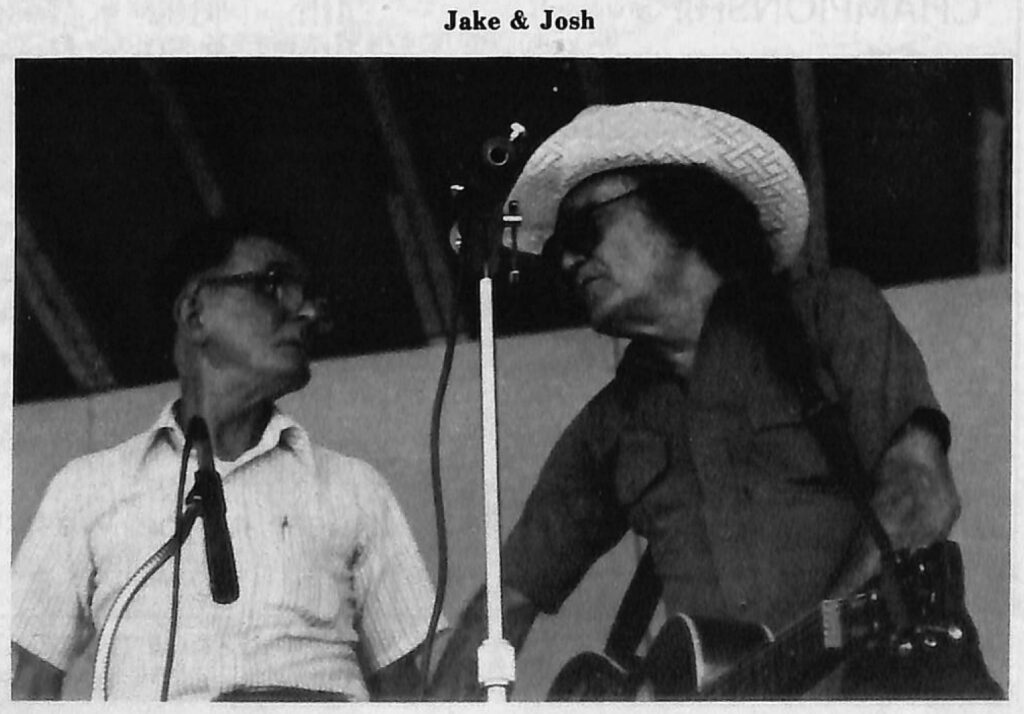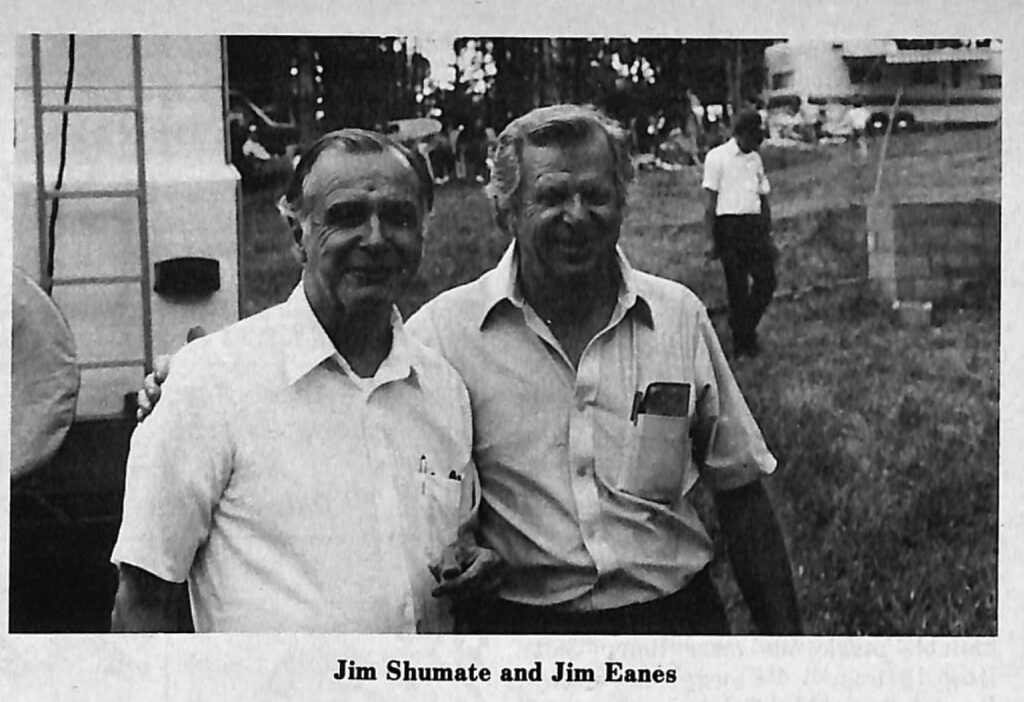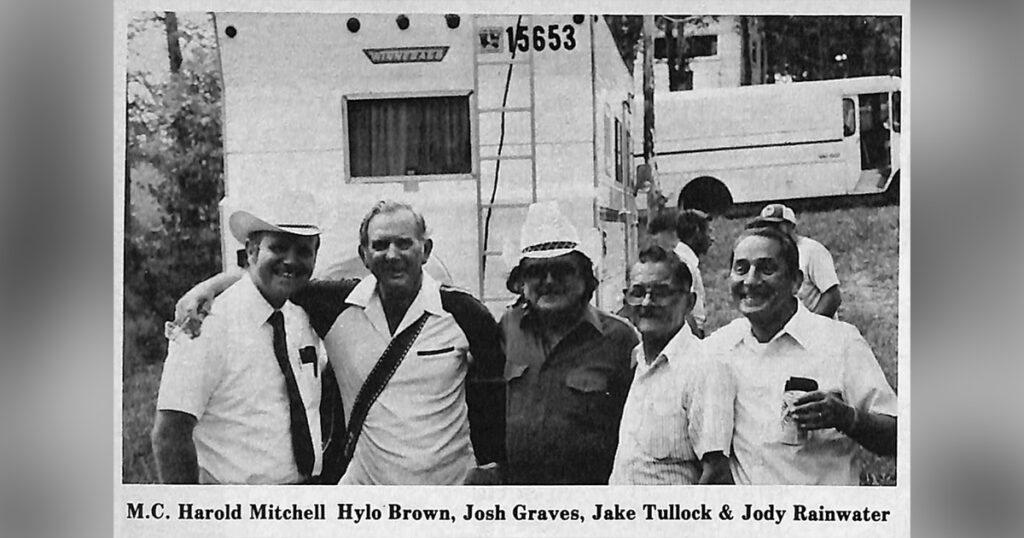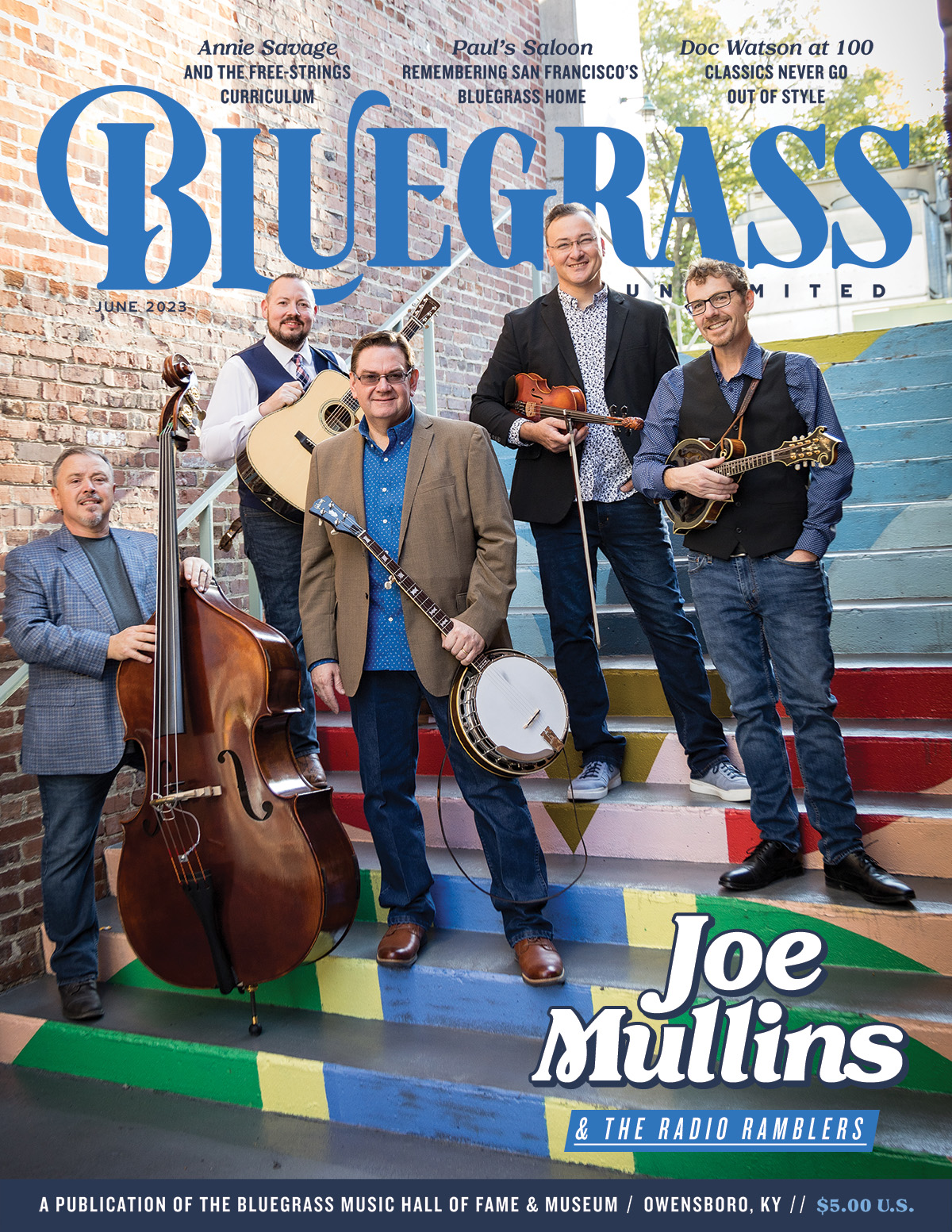Home > Articles > The Archives > Foggy Mountain Boys Reunion
Foggy Mountain Boys Reunion
Photos by Greg Reed
Reprinted from Bluegrass Unlimited Magazine
May 1984, Volume 18, Number 11
Lester Flatt had been gone almost four and a half years, and Earl Scruggs couldn’t be there, but the reunion of the Foggy Mountain Boys at Blue Grass Park, Camp Springs, N.C., Saturday, September 3, 1983 was a milestone in the eighteen-year history of bluegrass festivals. Lester Flatt, Earl Scruggs & the Foggy Mountain Boys were among the most popular, the most famous, and will more than likely be remembered by many as the very best bluegrass band there has ever been. For just over an hour, on that stage at Blue Grass Park, all the greatness of the Foggy Mountain Boys—not only their matchless music and their often larger-than-life individual and collective personal impact, but the honest, down-to-earth, unpretentious and in these days all to quickly receding way of life they exemplified—came alive again.
It took two years of planning by festival promoter John Maness to bring so many great and distinguished Foggy Mountain Boys alumni to the same place at the same time, but there they were, all together: Curly Seckler, the ageless bluegrass legend who practically invented the role of the tenor-singing specialist; the legendary “Uncle Josh” Graves, whose Dobro became the first major innovation in the instrumental makeup of a bluegrass band; Josh’s brilliant longtime comedic partner, the stalwart bass player “Cousin Jake” Tullock; Jim Shumate, whose stylish fiddling was heard on the very first Foggy Mountain Boys recording session; “Little Jody” Rainwater, another fine comedian-bass player, in the great tradition, who played bass and mandolin on perhaps the greatest of all Flatt & Scruggs recording sessions, the one that produced “Salty Dog Blues” and “Roll In My Sweet Baby’s Arms;” Hylo Brown, not only a featured singer with the Foggy Mountain Boys, but the leader of the band that alternated television-station circuits with Flatt & Scruggs for Martha White Flour; and Jim Eanes, an original Foggy Mountain Boy before joining Bill Monroe’s Blue Grass Boys, and writer of one of the great early Flatt & Scruggs recordings, “Baby Blue Eyes.”

Also poised to add their inspired contributions were members of the band Lester Flatt had designated as keepers of the flame, the Nashville Grass. Grouped around Curly Seckler were the outstanding young fiddler, the son of one of the greatest of all the bluegrass fiddlers, the late Paul Warren, who had worked with Lester Flatt during and after his partnership with Earl Scruggs for almost twenty-five years; the fine young bass player Bob Rodgers; Kenny Ingram who, at least as much as any banjo-picker in bluegrass today, has adopted as his own the consummate power, drive and no-nonsense good taste of Earl Scruggs in his prime; and the band’s unassuming miracle, Willis Spears, who, although few were aware of even his existence less than a hundred miles from Nashville during Lester Flatt’s lifetime, sings so skillfully and so much like Lester that it can drop the unwary in their tracks, and who can even on occasion be seen with Lester’s comtemplative, faraway look on his face. And one other gentleman who had played an important behind-the-scenes role in the Foggy Mountain Boys story stood by, ready to introduce the individual performers in turn, Lester’s close personal friend, the veteran Galax, Va. area air personality and promoter Harold Mitchell, who through the years probably set up as many “passing through” engagements for the band as even the most professional full-time booking agent could have done.
After a brief introduction by John Maness, and a roll call of assembled greats by this writer, the show began as so many Flatt & Scruggs shows through the years had done, with the familiar Martha White theme. Curly Seckler had usually been the front man for a large portion of the Flatt & Scruggs stage shows, so it was right and natural that he take the helm, which he did, guiding the group into one of the all-time Flatt & Scruggs classics, “Roll In My Sweet Baby’s Arms.” From then on, a sense of euphoric nostalgia reigned supreme. The cornerstones of the greatness of The Foggy Mountain Boys worked their inimitable magic one more time: “Salty Dog Blues,’’ “Foggy Mountain Breakdown,” “My Cabin In Caroline,” “Shuckin’ The Corn,” and almost a dozen more. The music, of course, was great, as it always had been, but there were many other truly heartwarming aspects of the Foggy Mountain Boys Reunion, not the least of which was the tremendous interpersonal warmth and admiration flowing among these great men who had shared in a great legend. An important part of the uniquely successful Flatt & Scruggs stage show had always been the comedy portion, and the two best-remembered practitioners of that virtually lost art were together onstage again. Jake Tullock, now a police dispatcher in Etowah, Tennessee, had not been a full-time performer since leaving the Nashville Grass a dozen years ago, and his comedy partner Josh Graves had done little if any comedy work in the intervening years; yet, together they fell effortlessly right back into their priceless routines. To see Jake Tullock, cheerfully minus his teeth, but minus absolutely none of his old incisive wit, inspired delivery and the pluperfect timing that only the greatest comedians possess, very nearly break up a delighted Josh Graves. Playing straight man to Jake as he always did, they let the audience relive some of the greatest moments of the finest stage show bluegrass music has yet produced. And a rejuvenated Josh Graves was playing the Dobro with all the old joyous, adventuresome drive and spontaneity that made him the original kind of the Dobro.

Particularly heartwarming, too, was the fiddle work of Jim Shumate and Johnny Warren, on great old tunes like “Old Joe Clark’’ and “Katy Hill.” Johnny Warren richly displayed his absolute, dedicated fidelity to the great traditions of which his father was so important a part, together with his own expert, fully- developed style. Jim Shumate played “My Cabin In Caroline” as if it were again the summer of 1948. Hylo Brown sang “The Prisoner’s Song” and there was more inspired comedy from “Little Jody” Rainwater. Jim Eanes sang the 1952 composition, “I Wouldn’t Change You If I Could,” that has recently been a country hit again. Jim brought along fiddler Les Woodie, now general manager of radio station WKDE in Alta Vista, Va., but in 1949-50 the fiddler for the Stanley Brothers. Ironically, a strong personal and professional rivalry had begun brewing between Flatt & Scruggs and the Stanleys about the time Les became acquainted with Lester and Earl, but Les had never participated in it, and his spoken tribute to Flatt & Scruggs, as well as his still-adept fiddling, added a nice touch to the proceedings. Hylo Brown had never actually recorded with Flatt & Scruggs (although bootleg LPs from transcriptions exist), so his duet with Curly Seckler on Flatt’s “Little Cabin Home On The Hill” was a special treat, as was Josh Graves’ “Maiden’s Prayer,” always one of his most requested numbers on personal appearances, but which he had not recorded with the Foggy Mountain Boys. Toward the end of the program, the Nashville Grass performed a pair of gospel songs, each of them in its own way notable. The first, “It Won’t Be Long,” is from an undeservedly forgotten Flatt & Scruggs 1955 recording made available in 1957 and not since. “I Heard My Mother Call My Name In Prayer,” always a particular favorite of Lester Flatt’s among the mountain gospel standards, was sung by Willis Spears and the group so movingly that Jake Tullock, for one, found tears of fond remembrance welling in his eyes.
Reunions of former members of great bluegrass bands have been a part of bluegrass festivals since the very beginning. The Foggy Mountain Boys Reunion was the particular dream and creation of John Maness, leader of the Bass Mountain Boys and owner of Bass Mountain Bluegrass Park outside Burlington, N.C. John, in his own unflamboyant but determined manner, has quietly stabilized the festival situation at Blue Grass Park by staging the Labor Day events. Booking established bands can be sufficiently absorbing for the festival promoter, but trying to coordinate diverse musicians with a miscellany of prior commitments can be even more so. Nevertheless, Maness persevered for two years, until he was able to bring together most of the surviving Foggy Mountain Boys alumni in this historic reunion. It is only fitting that the reunion took place at Blue Grass Park, the long time bluegrass showcase of Carlton Haney, the man who engineered the first multi-day festival—band-member reunion, at Fincastle, Va. in 1965. Haney was at Blue Grass Park September 3, and he was pleased. John Maness was aglow with satisfaction. The audience was, of course, delighted, and even the musicians after all these years and thousands of shows, were exhilarated—at last word, several of them were discussing making the reunion of the Foggy Mountain Boys an annual event at different festival sites around the country. This would not only bring many of the living legends of bluegrass together for younger fans who might never have seen them, and older fans who remember them so fondly, but significantly help to preserve and enhance the cherished memory of the great years of Lester Flatt, Earl Scruggs & the Foggy Mountain Boys.

